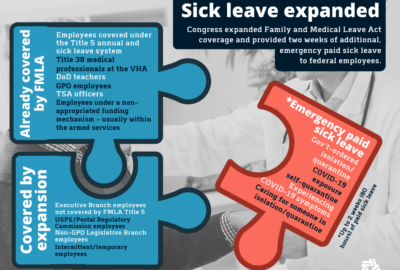To listen to the Federal Newscast on your phone or mobile device, subscribe in PodcastOne or Apple Podcasts. The best listening experience on desktop can be found using Chrome, Firefox or Safari.
- The $1.9 trillion COVID-19 relief package that cleared the House on Friday night includes a few key provisions for federal employees. One gives federal employees up to 15 weeks of paid leave to quarantine, recover from illness and care for sick family members or children who are learning from home. Another automatically presumes frontline federal employees contracted COVID-19 at work, meaning those employees will be eligible for certain workers compensation benefits through the Labor Department. The provision doesn’t cover any federal employee who has been teleworking.
- The Navy may be dealing with another shipboard COVID outbreak. The latest focus is on two vessels deployed to the Middle East: The amphibious transport dock USS San Diego and the guided-missile cruiser USS Philippine Sea. The Navy said about 12 sailors aboard the San Diego had tested positive for coronavirus as of Friday. That ship is in the middle of a port visit in Bahrain, and officials said it’s since been placed in a “protective bubble” to contain the spread. The USS Philippine Sea is still underway in the region. Officials aren’t disclosing its location, but said several sailors are suspected to have come in contact with the virus.
- Top lawmakers overseeing military personnel said now may be the time to take sexual assault prosecutions out of the chain of command. Senate Armed Services Committee Chairman Jack Reed (D-R.I.) said he is seriously considering the change for the 2022 National Defense Authorization Bill. House Armed Services Military Personnel Subcommittee Chairwoman Jackie Speier (D-Calif.) strongly supports moving prosecutorial jurisdiction. The Defense Department is currently undertaking at 90-day review on sexual assault. (Federal News Network)
- Women are paying a higher price for serving in the military. A new government watchdog study finds that enlisted women are paying more out-of-pocket costs for uniforms than men are. That’s because the military services only allow certain clothing items to be paid for under the annual allowance given to troops. For example, there are 15 items of clothing both men and women in the Army must pay to replace. However, the cost for women is nearly $650, while it is about $380 for men. Some of the largest disparities were in the Air Force and Marine Corps where women are paying three times as much as men. (Federal News Network)
- Cases of workplace discrimination reaching the Equal Employment Opportunity Commission fell sharply in fiscal 2020. The caseload has been trending down for a decade, reaching a low of fewer than 68,000 last year. In 2010, the EEOC handled nearly 100,000 cases. Two-thirds of last year’s cases had to do with discrimination based on race or gender, a ratio that has held steady. The EEOC said it trimmed its backlog by resolving about 71,000 cases. For non-federal workplaces, including state and local government, the commission secured $439 million in settlements.
- The Cyberspace Capability Engineers from the 780th Military Intelligence Brigade are the winners of team competition of the President’s Cybersecurity Cup competition. The team beat out 250 other groups of federal cyber experts to win the second annual competition. The Cyberspace Capability Engineers received the highest cumulative point total across both days of the teams competition, and nearly fully solved all five challenge scenarios presented on Day two. They were one of 10 teams to make it to the finals, which culminated with the Feb. 25 competition.
- Experts credit Vice Adm. Nancy Norton for reviving the Defense Information Systems Agency. Air Force Lt. Gen. Robert Skinner took the helm of DISA on Friday, replacing Vice Adm. Nancy Norton who retired the day before. Norton, who spent 34 years in military service, left DISA a much different place than she found it more than two years ago. Former DISA executives said Norton turned the agency around by restoring confidence across DoD and on Capitol Hill, and improved employee morale. At one point in 2018, Congress considered axing DISA. Now the agency is widely praised for the important role it plays in ensuring DoD has the technology it needs to support warfighters. (Federal News Network)
- New cyber diplomacy capabilities for the State Department moved forward in Congress. The House Foreign Affairs Committee approved the Cyber Diplomacy Act, which requires the agency to stand up an Office of International Cyberspace Policy that would set diplomatic norms in cyberspace. The committee also passed the State Department Authorization Act, which requires the agency to develop a five-year staffing plan and provide detailed workforce data for the civil and foreign service. The bill also includes funding for diplomatic programs and embassy security, construction and maintenance.
- The General Services Administration isn’t making the most of its vehicle fleet in the Washington metro area, according to its inspector general. The watchdog found GSA reduced its fleet in the National Capital Region since a 2016 audit, but found 90% of vehicles didn’t meet minimum mileage standards in 2019. The IG recommended the chief administrative services officer develop a method to removing underutilized vehicles.
- Past marijuana use doesn’t immediately disqualify an applicant from a job in the federal government. The new guidance comes from the Office of Personnel Management. OPM said agencies should take a variety of factors into account when determining whether an applicant is suitable for employment in the federal government. Those factors include the kind of position, and the nature and date of the drug use. OPM said these decisions are especially murky now that 15 states and the District of Columbia have decriminalized medical and recreational marijuana use. (Federal News Network)
- A group with a record of bird-dogging the Department of Veterans Affairs has won a Freedom of Information Act lawsuit against the Los Angeles Veterans Affairs hospital. The White Coat Waste project secured documents it said detail research that is abusive to kittens, which are euthanized with pentobarbital after the experiments. A bill in Congress would force VA to stop research using animals in medical research.
- A major airliner has to shell out $49 million for fraud charges on postal service contracts. The Justice Department said United Airlines have agreed to pay penalties in connection to a fraud scheme created by former employees of its cargo division. DOJ said from 2012 to 2015, the company submitted false automated delivery scan data to make it seem like mail items were delivered on time, but actually were not.
Copyright
© 2024 Federal News Network. All rights reserved. This website is not intended for users located within the European Economic Area.




